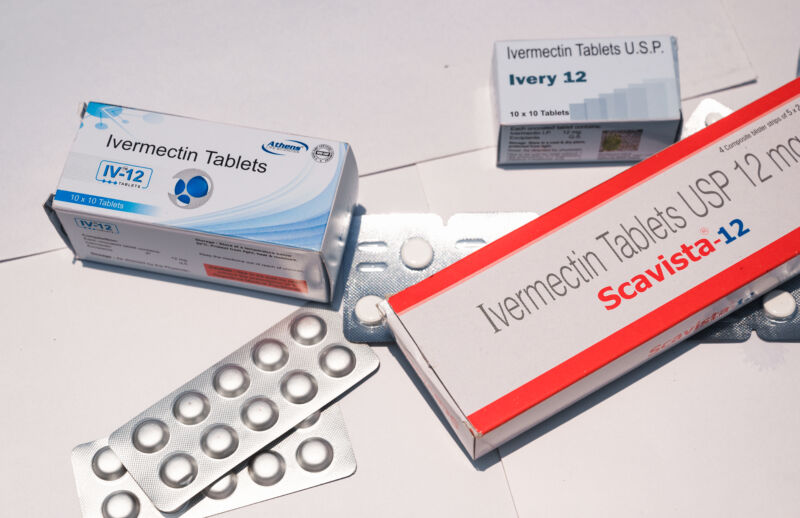
The antiparasitic drug ivermectin failed to treat COVID-19 in yet another randomized clinical trial, but the drug remains popular amid the pandemic thanks to Republican politics. That’s the takeaway from two separate studies published Friday in JAMA Internal Medicine.
Together, the studies raise yet more concerns for the use of ivermectin against the pandemic virus—as well as the reasons behind its use, which appear politically motivated.
“Political affiliation should not be a factor in clinical treatment decisions,” the Harvard researchers behind one of the studies concluded. “Our findings raise concerns for public trust in a non-partisan health care system.”
Political sway
The study began when researchers led by Harvard health policy researcher Michael Barnett took note of the sharp increase in prescriptions for ivermectin during the pandemic despite evidence that the drug is ineffective at treating COVID-19. The researchers set out to see if prescription levels could be linked with county-level political voting patterns in the 2020 US presidential election. For comparison, they also looked at the prescribing patterns for another antiparasitic drug called albendazole as well as the immunosuppressive drug methotrexate.
Barnett and colleagues reviewed medical claims from more than 18.5 million adults to assess prescribing practices in counties across the US from January 2019 to December 2020. They then sorted counties into four groups based on their share of Republican votes, with the first quartile having the lowest share of Republican votes and the fourth having the highest
Overall ivermectin prescribing increased 964 percent in December 2020 compared with prepandemic prescription levels in 2019. But those December 2020 prescriptions weren’t evenly distributed; the counties with the highest shares of Republican votes had the highest levels of ivermectin prescribing. In fact, the higher the share of Republican votes in a county, the higher the level of ivermectin prescribing.
The authors saw a similar pattern with hydroxychloroquine after the Food and Drug Administration revoked an emergency use authorization for use against COVID-19 in March 2020. Use of the immunosuppressive drug increased in the later half of 2020, with the highest prescribing in counties with the highest shares of Republican votes. Meanwhile, there were no such politically linked trends or changes in prescription levels for the two control drugs, methotrexate and albendazole.
“Our findings are consistent with the hypothesis that US prescribing of hydroxychloroquine and ivermectin during the COVID-19 pandemic may have been influenced by political affiliation,” Barnett and his colleagues concluded. The findings add context to the continued use of ivermectin for COVID-19, even as evidence continues to mount finding that the drug is ineffective and potentially dangerous.
Failed trial
Alongside Barnett’s study, researchers in Malaysia reported results from a randomized clinical trial involving 490 high-risk COVID-19 patients. In the trial, ivermectin failed to prevent COVID-19 from progressing to severe disease in these high-risk patients. It also failed to make any statistically significant difference in a variety of COVID-19 outcomes, including timing of disease progression, length of hospital stay, the need for mechanical ventilation, the need for intensive care, and death.
In Malaysia, people are required to report cases of COVID-19 to authorities, and people at risk of disease progression are either referred to the hospital or admitted to a COVID-19 quarantine center. That all made it easier to closely track trial participants. The trial enrolled people who were COVID-19 positive, age 50 or older, and had at least one underlying medical condition. At the time of enrollment, the 490 patients were considered to have mild to moderate infections. From there, 241 were randomly assigned to get oral ivermectin for five days, and 249 were randomly assigned to get standard care.
At the end of the study, 52 of the 241 patients who received ivermectin (21.6 percent) had progressed to severe disease, while 43 of the 249 patients who just received standard care (17.3 percent) progressed. While there were no significant differences in other disease outcomes, the researchers did document more side effects in the ivermectin group.
Overall, 44 patients reported side effects, with 33 of them being in the ivermectin group. Diarrhea was the most common side effect, which ivermectin is known to cause. There were also five cases of severe adverse reactions, four of which were in the ivermectin group. Two patients in the ivermectin group had heart attacks, one had severe anemia, and one developed hypovolemic shock as a result of severe diarrhea. The one remaining severe reaction in the control group involved abdominal bleeding.
Not the first time
While some early clinical work had suggested ivermectin may be effective for treating COVID-19, experts have since noted methodological weaknesses in those studies. Moreover, the findings in the Malaysia trial echo two other randomized clinical trials, in Colombia and Argentina. These trials also found no benefit to using ivermectin to improve COVID-19 symptoms or reduce hospitalization rates.
Overall, the authors of the Malaysian trial conclude that, in their “randomized clinical trial of high-risk patients with mild to moderate COVID-19, ivermectin treatment during early illness did not prevent progression to severe disease. The study findings do not support the use of ivermectin for patients with COVID-19.”
https://arstechnica.com/?p=1835789

